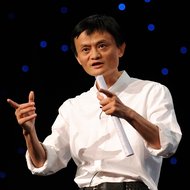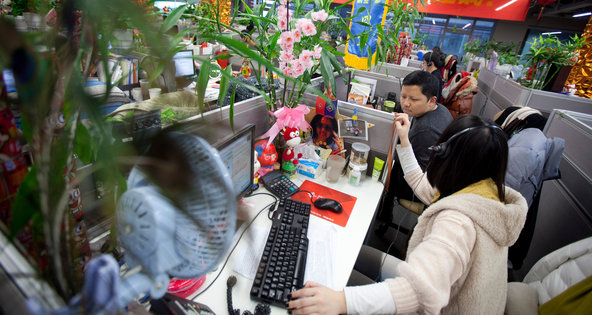Since Marissa Mayer left Google to lead Yahoo nine months ago, the company’s stock is up more than 50 percent, buoyed less by optimism in Yahoo than Wall Street’s giddiness over Alibaba, the Chinese Internet company in which Yahoo retains a 20 percent stake.
Alibaba has signaled that it is preparing for an initial public offering that analysts predict could value it at $55 billion to more than $120 billion, double to five times more than Yahoo’s $26.2 billion market capitalization.
“If you own Yahoo for Alibaba, you’re doing just great,” said Colin Gillis, an Internet analyst at BGC Partners. “But if you own it for the core business, you’ve got some speed bumps.”
On Tuesday the company reported that net income in the first quarter rose 36 percent to $390 million, or 35 cents a share, from the year-ago quarter. Wall Street analysts had expected net income of 24 cents a share.
But much of that was because of Alibaba. The income contribution from Yahoo’s equity interests in Alibaba and Yahoo Japan was $217.6 million, well above its own first quarter operating income of $186 million.
Meanwhile, Yahoo’s revenue was down. The company said revenue was $1.14 billion, down 7 percent from the year-ago quarter. Excluding traffic acquisition costs, revenue was flat at $1.07 billion. That news sent Yahoo’s stock down about 4 percent in after-hours trading, after closing at $23.79 on Tuesday.
Yahoo reported first-quarter earnings at a critical juncture for Ms. Mayer. Investors are eager to see whether she can increase revenues, which have languished in an increasingly competitive landscape.
Once the biggest seller of display ads, Yahoo lost that position to Facebook and Google in 2011. In the first quarter, Yahoo’s display ad business fell 11 percent, to $455 million, compared with a year ago, even as total display advertising increased 18.1 percent to $17.7 billion in the United States, according to eMarketer.
Ms. Mayer told analysts Tuesday that she planned to lure back advertisers by starting a “chain reaction” that begins with hiring engineers to improve Yahoo’s core products, which include e-mail, sports and finance offerings, and optimizing them for Yahoo’s mobile and tablet users.
Without its own mobile hardware, browser or social platform, Yahoo, which is based in Sunnyvale, Calif., has a long way to go in mobile. Ms. Mayer has said she plans to quickly develop a mobile presence through “smaller-scale acquisitions” of mobile app companies. She has acquired six start-ups since joining Yahoo, as much for their engineering talent as for their products.
Ms. Mayer has put those engineers to work making Yahoo’s Web products more applicable to mobile users. Those efforts seem to have paid off. Yahoo now has more than 300 million monthly mobile users, up from 200 million three months ago.
Article source: http://www.nytimes.com/2013/04/17/technology/yahoo-reports-quarterly-earnings.html?partner=rss&emc=rss


